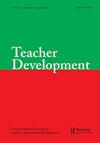Mentor teachers modeling: affordance or constraint for special education pre-service teachers in the practicum setting?
IF 1.1
Q3 EDUCATION & EDUCATIONAL RESEARCH
引用次数: 5
Abstract
ABSTRACT Special education (SPED) teacher preparation programs are intended to help preservice teachers (PSTs) learn and adopt effective teaching practices to serve students with special needs. To help SPED-PSTs learn needed skills, SPED mentor teachers (MTs) must employ high-leverage practices (HLPs) such as performance feedback, conferencing, and modeling. Although most teacher preparation programs utilize modeling in preparing PSTs, little is known about how SPED-MTs use this mentoring tool. An interpretative phenomenological analysis was conducted to explore how SPED-MTs engaged PSTs in modeling practices during a practicum experience. Data from semi-structured interviews were analyzed to describe SPED-PST and SPED-MT attitudes, experiences, and use of modeling over the course of a special education practicum, focusing on MTs’ modeling strategies and PSTs’ subsequent behaviors. The relative impacts of simple and cognitive modeling on the PST-MT relationship were compared. SPED-MTs’ modeling foci were compared to recommended HLPs. This preliminary study provides recommendations for SPED-MTs’ use of modeling with SPED-PSTs.导师模式:对实习环境下特殊教育职前教师的启示或约束?
特殊教育(SPED)教师培训项目旨在帮助职前教师学习并采用有效的教学实践来服务有特殊需求的学生。为了帮助SPED- pst学习所需的技能,SPED导师教师(mt)必须采用高杠杆实践(hlp),例如绩效反馈、会议和建模。尽管大多数教师培训项目都利用建模来准备pst,但人们对speed - mt如何使用这种指导工具知之甚少。一项解释性现象学分析被用于探索在实习经历中,speed - mts如何让PSTs参与建模实践。我们分析了半结构化访谈的数据,以描述特殊教育实习过程中speed - pst和speed - mt的态度、经验和建模的使用,重点关注mt的建模策略和pst的后续行为。比较简单模型和认知模型对PST-MT关系的相对影响。将speed - mt的建模病灶与推荐的hlp进行比较。这项初步研究为speed - mts使用speed - psts建模提供了建议。
本文章由计算机程序翻译,如有差异,请以英文原文为准。
求助全文
约1分钟内获得全文
求助全文
来源期刊

Teacher Development
EDUCATION & EDUCATIONAL RESEARCH-
CiteScore
2.10
自引率
8.30%
发文量
33
期刊介绍:
Teacher Development is a fully refereed international journal publishing articles on all aspects of teachers" professional development. It acts as a forum for critical and reflective attention to practice in teacher development and aims thereby to contribute to the quality of professional development. The journal takes a "whole-career" view of teacher development, and work from both international and inter-professional perspectives is welcome. Articles may deal with teacher development in varying political and professional contexts, and may be in a variety of styles, in keeping with the diversity of activity in professional development.
 求助内容:
求助内容: 应助结果提醒方式:
应助结果提醒方式:


